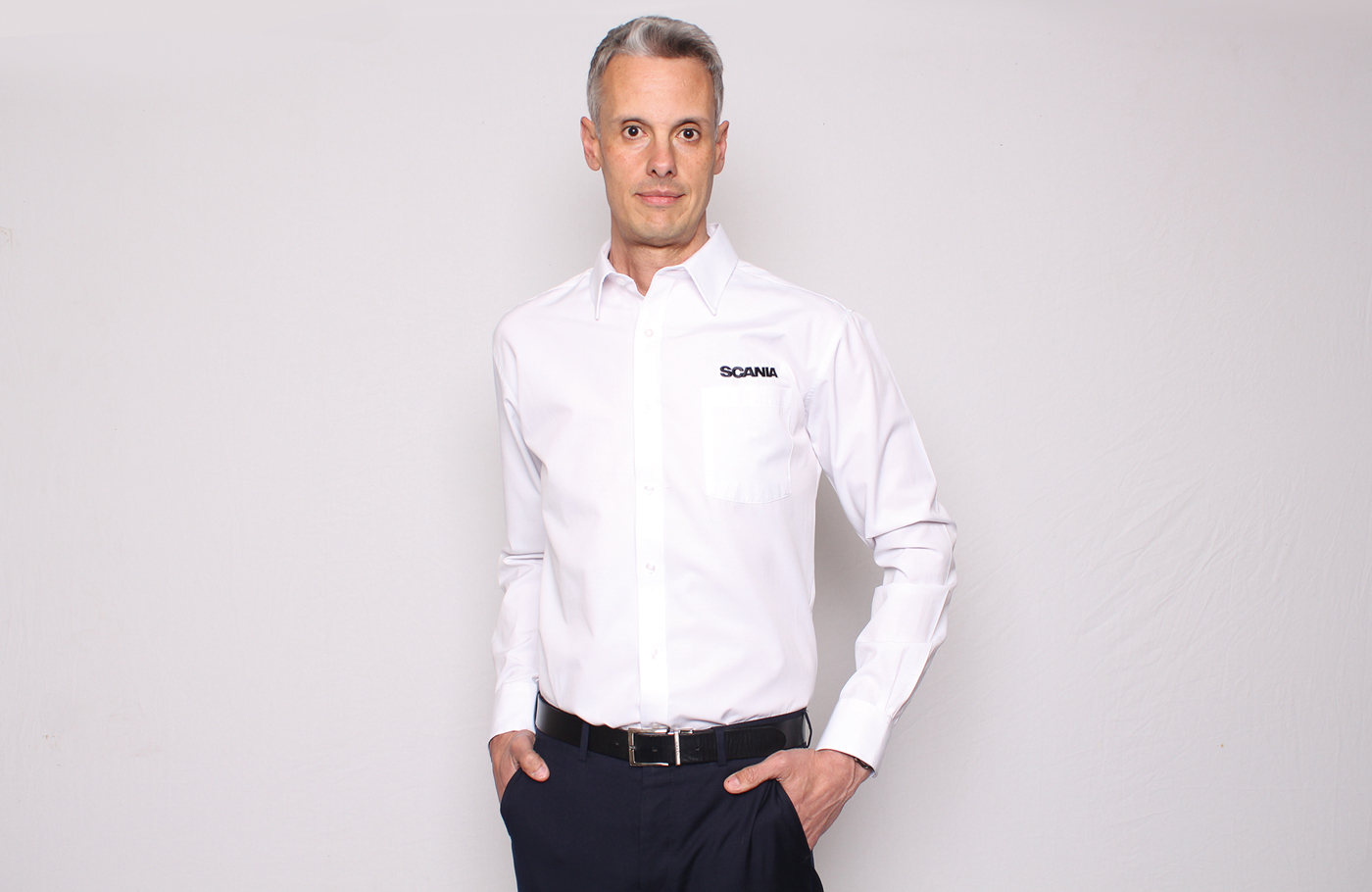Face to face with Scania’s Fabio Souza
Face to face with Scania’s Fabio Souza
The South African transport industry has probably never experienced more turbulent trading conditions. CHARLEEN CLARKE goes face to face with Fabio Souza, managing director of Scania Southern Africa, to ask him – amongst other things – what the company is doing to support local operators.
Please tell us a little about your career and how it has prepared you for your current role as MD Scania Southern Africa
I started my career at Saint-Gobain in Brazil, initially as a trainee and then as a product engineer in the abrasives division. Then, 19 years ago, I moved to Scania.
Spending 19 years in a company prepares you for anything. I had the opportunity to work in three different environments: one region and then two countries. The region was Latin America, where I was a parts pricing analyst and then head of parts pricing.
Then I moved to Mexico, where I was the service manager and then service director. This really prepared me for the next step that I took in my career. It was, at that time (in 2006), considered one of the worst markets for Scania in the world. We were competing with the American brands. Scania had decided to stop producing the bonneted T-truck, which had a devastating effect.
I learnt a great deal during my seven years in Mexico. I was there during the swine flu outbreak. It was nothing compared to Covid-19, but I learnt about dealing with pandemics, which was useful. Mexico was like Wuhan because the disease started there. At that time, we were only selling buses and the bus market was devastated. We had to build a very resilient organisation. Then came the Lehman Brothers crash, which also had a massive impact on Mexico. We decided that we needed to do something different. So, we started servicing at customer facilities. This was completely new at the time, and it worked very well indeed.
In 2013, I moved to Brazil, where I worked as service director at Scania. Brazil is not a country for beginners. It is the biggest single market for Scania in the world, and so you feel the pressure. This makes you stronger; it makes you more resilient. I have also learnt a lot from relationships with dealers; when you see the business through the eyes of an independent business owner, you gain new insight. Efficiency is extremely important, and this is something I am bringing here.
What have been your professional and personal highlights in your career thus far?
From a professional point of view, moving from Latin America to living abroad has been a fantastic opportunity. Living and working abroad opens your mind and makes you more flexible. Moving to Mexico was a milestone, as was moving back to Brazil. And now, moving to South Africa is even better. The experience that you gain working in diverse and challenging markets such as these is highly valuable.
What did you expect when coming to South Africa? What appealed to you about coming here? How has your actual experience been (versus your expectations)?
It was a relatively easy decision to make. Yes, I was sitting in a bigger market. Last year we delivered over 2 300 vehicles in SA; in Brazil, we delivered around 12 000. But I also moved from being service director to being MD; this was the natural next step in my career. I thought that it was an excellent opportunity. There is South Africa, which is the lead market. However, we have our strategic markets as well. We are also commercially responsible for Namibia, Botswana and Mozambique. In addition to this, we also have the independent markets under the Southern Africa structure – Zambia, Zimbabwe and Malawi. This variety in our portfolio is very interesting.
In Brazil, we don’t work in the used market; the operators sell their trucks themselves. So, we don’t have a used truck department at Scania Brazil. Here, of course, it is a key part of the business. There is also no rental department at Scania Brazil.
So, while SA is not as big as Brazil, it is far more complex. Covid has meant difficult times but it has also created the opportunity to change things fast. I changed things in three months that I would probably have changed in three years. Covid has also brought us together as a team.
Briefly, how did Scania South Africa perform in 2019 (in terms of volumes and market share)?
Given that we introduced our New Truck Generation in the middle of 2019 – resulting in immense stock shortages in the first half of the year – I would say that it was a very decent year for Scania South Africa. Our volumes remained stable – despite stock challenges – and so did our market share.
What are your goals for the company in 2020?
In my view, at a very high level, SA is a market of 12 000 heavy commercial vehicles a year. I think the market will be around 9 000 to 10 000. I am hoping that the deviations as a result of lockdown are over and that the market will now return to normal. We have experienced delays in bringing product to market. In my humble opinion, we reacted very fast. We have taken action. I am confident that, regardless of the crisis, we will deliver good results.
What has been the impact of Covid-19 on Scania (both here in South Africa and globally)?
There has definitely been an impact in both the commercial and operational sense for our organisation. However, we are catching up. April and May were extremely tough. We measured the average mileage at which the vehicles were running. Vehicles here in SA are running at 10 000 km a month. In April, this probably dropped to 2 000 km a month. May was a little bit better – around 4 000 km. Now we’re sitting on about 9 000 km, so we are catching up.
Europe is recovering faster than South Africa; the level of order intake is high. Asia is back to normal levels. Latin America is still struggling but is catching up.

Scania announced major global job cuts in June. How has this impacted on Scania South Africa?
First of all, it is not pleasant: I am not happy to impact on people’s lives and society in general. I take full responsibility for it and – when left with no alternative – you need to react. You need to adjust. You need to get leaner and you need to be more efficient. Of course, there is an impact, but we are preparing Scania to be healthier and stronger for 2021.
How has the pandemic affected the transport industry (both here in South Africa and globally)? What has Scania done to support local customers during this exceptionally difficult time?
We have a very important partner here, namely Scania Finance. We have rescheduled the payments for customers who were struggling. We have put a huge effort into supporting customers during this tough period. It is the way it should be; it’s a partnership. We need to think long term. Everyone needs to be more efficient; the crisis can be a huge opportunity. When it comes to fuel consumption, we know we are best in class; this is a global phenomenon and it’s thanks to the development of the new truck.
Customers know that a truck that is not efficient could leave them in trouble. Customers are looking at TCO like never before. Our dealer network is well established and strategically positioned, and it is well placed to support customers too.
Are operators turning to used or rental trucks during this challenging time?
The performance of our rental business was not impacted by the crisis. We know that the rental solution is ideal for short-term needs. Unfortunately, there are no official statistics pertaining to used, but the market has been unaffected by the crisis.
Has Covid-19 led Scania to delay any product launches or product extensions?
Not really. We were so lucky with our timing, with the launch of the new truck last year. Nothing was planned for this year.
How long do you plan to remain in South Africa?
In November, I will have been here for one year. My contract expires two years after that. But my view is that the longer you stay, the more you deliver. Also, I like to be part of the culture. The day I leave, I will be a little bit Mexican and Brazilian and South African too.
What legacy would you like to leave in this market?
First of all, I would like to leave the strongest organisation possible. I would like our market to be the point of reference and benchmark in all areas of our business. I want everyone to realise that we really care about our customers. If I can embed this in people’s mind, I have done my job.
Finally, what is your outlook for the future of Scania South Africa and the South African transport industry in general?
What I see from the industry is a lot of pressure on profitability. This is not unique to our industry. It won’t be easy to maintain profits. This will drive the industry to be more professional and care more about the little details that can affect the bottom line. It will encourage companies to train their drivers better because profits will be squeezed. When it comes to Scania, I am extremely confident. We have a strong foundation as a company and a strong dealer network. We have the right people and products in place. I think that Scania will enhance its position in this region; we have everything in place to get there.
Published by
Charleen Clarke
focusmagsa




